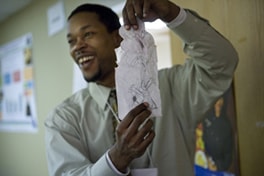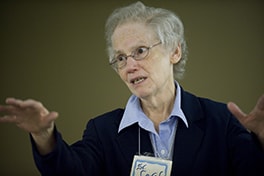

Photos by: Lisa Johnston
By Jennifer Brinker
ST. LOUIS, MO—Sister Carol Schumer believes in giving people a hand up, not a hand out. But she also knows that one does not have to go it alone when facing the struggles of life.
For 15 years, the Daughter of Charity has served as a parenting skills specialist with the Fathers’ Support Center in north St. Louis. The center’s core program is The Family Formation — a six-week “boot camp” — that gives fathers a chance to develop their personal and parenting skills. The program also helps them to develop spiritually and emotionally to become stronger fathers.
Sister Carol’s past life as a school teacher and administrator is evident in how she approaches her class. She wants the tables in a u-shape, so everybody can see one another. Small bowls of candy are scattered around. And nobody is an observer in her class, even the center’s staff who stop by for a visit.
“Everybody who comes has to sit at the table,” she said.
The men are there because they want become more involved in their children’s lives. Some have custody of their children. Some don’t. Others are struggling with drug or alcohol use. Sister Carol said that while she still gets nervous on the first day of class, she knows that she’s right where she needs to be. She noted that her service fits in well with the charism of the Vincentian community, the Daughters of Charity, which she entered in 1966 from her hometown of Perryville.
“Our charism is service to persons who are poor,” she said. “If Jesus was here now, He’d be right alongside these men. It is a blessing to be able to walk with them.”
Sister Carol started as a volunteer at the Family Support Center shortly after it opened in 1998. She had learned about the center through a Vincentian priest, Father Ed Murphy. Since its founding, the center has served more than 9,000 fathers with programs that include employment assistance and mentoring, a legal clinic and a Fathers’ Rap group, the center’s after-hours prorgam. The center recently received a $722,000 Mathematica Policy Research grant, issued by the U.S. Department of Health and Human Services’ Administration for Children and Families, which will analyze the program as a possible national model.
Over the past 15 years, Sister Carol has reached more than 1,200 men in the 85 classes she has facilitated. She tells each participant that there are three key elements needed to become healthy — high self-esteem, self-discipline and social competence.
Her influence as a Catholic woman religious also is apparent. “We start each class with prayer. We discuss how we’re each unique and special — and I feel that is God’s image in us,” she said. “I regularly bring up faith. The center’s administration is OK with this. I tell the men that God is there to support us, and if we don’t have a higher power, we need to get one.”
Over the course of the program, these dads learn how to effectively discipline children and manage their anger and emotions. They also discover their personal temperament and the thinking stages of children. She played out a scenario in which a 2-year-old spilled milk. She shouted out to the class — “Did you spill the milk?” — and then asked the men what they thought the child’s response would be.
“No,” said one father.
“I didn’t do it,” said another.
“That’s right,” she said. “It doesn’t do us any good — or the child — to ask if they did it. At that age, they don’t understand what it means to lie. Now a 10-year-old lies. You need to know the difference.”
Sister Carol also works quickly to break down any potential racial barriers — the majority of men in the class are African-American — by asking them how they feel about being led by a white, religious sister. All of the fathers in her recent class said they didn’t have a problem with her being another race, but some asked how she could contribute without any children of her own.
The second of nine children encouraged the discussion, adding that “emotions block thinking. You need to tell me how you feel about me — this white woman who has no children. Then we can work through those feelings to get to what you’re thinking.”
One of the fathers, Franklin Thomas, said he knows “you’re going to tell me some things I want to hear, and some things I don’t want to hear.” He acknowledged that society sometimes sees black men as good for “nothing, except to pay child support.”
“You have the power within you to change that,” she said. “Gentlemen, you have to change that. Don’t let anybody tell you that you aren’t important in the life of your child.”
For more information about Fathers’ Support Center, St. Louis, visit www.fatherssupportcenter.org.
